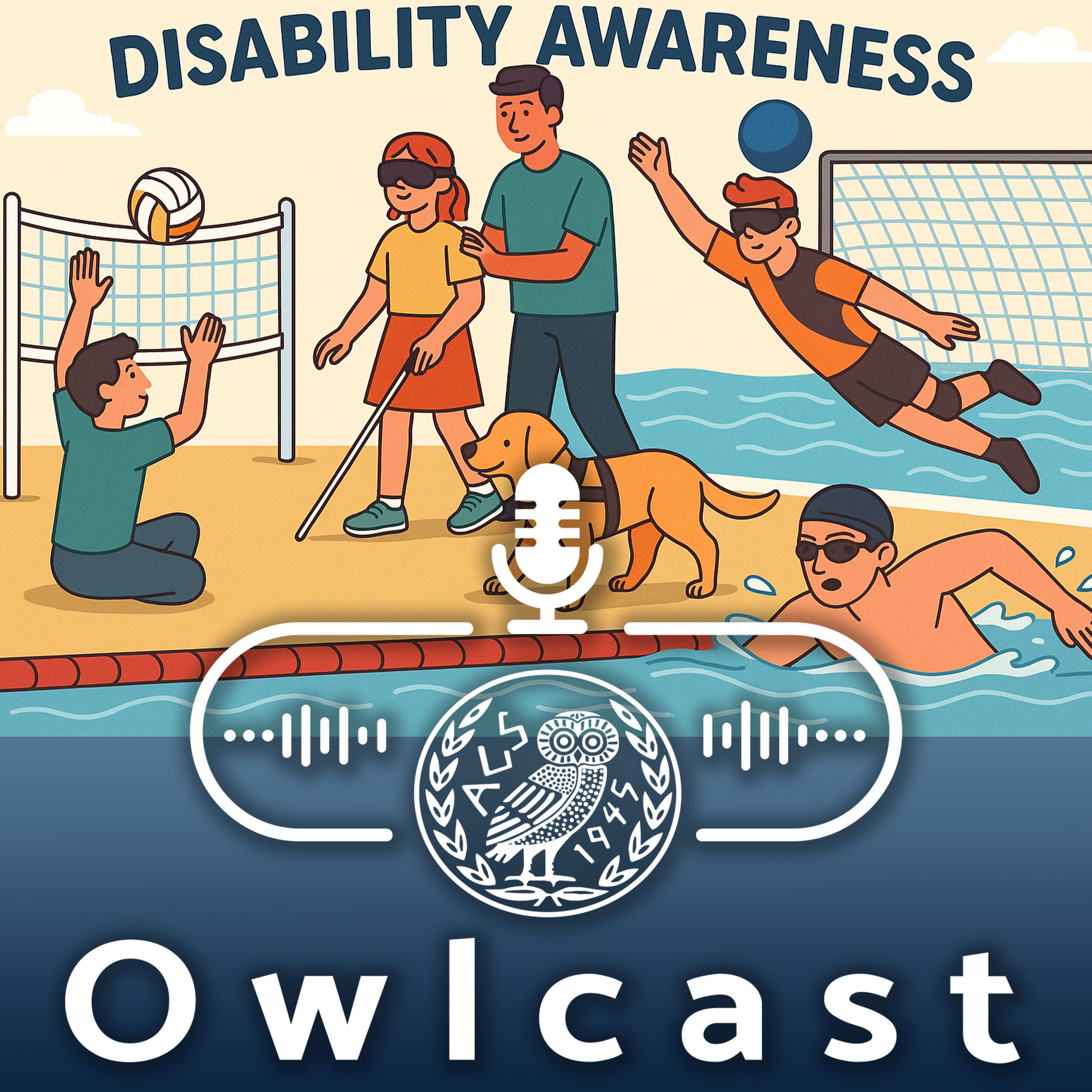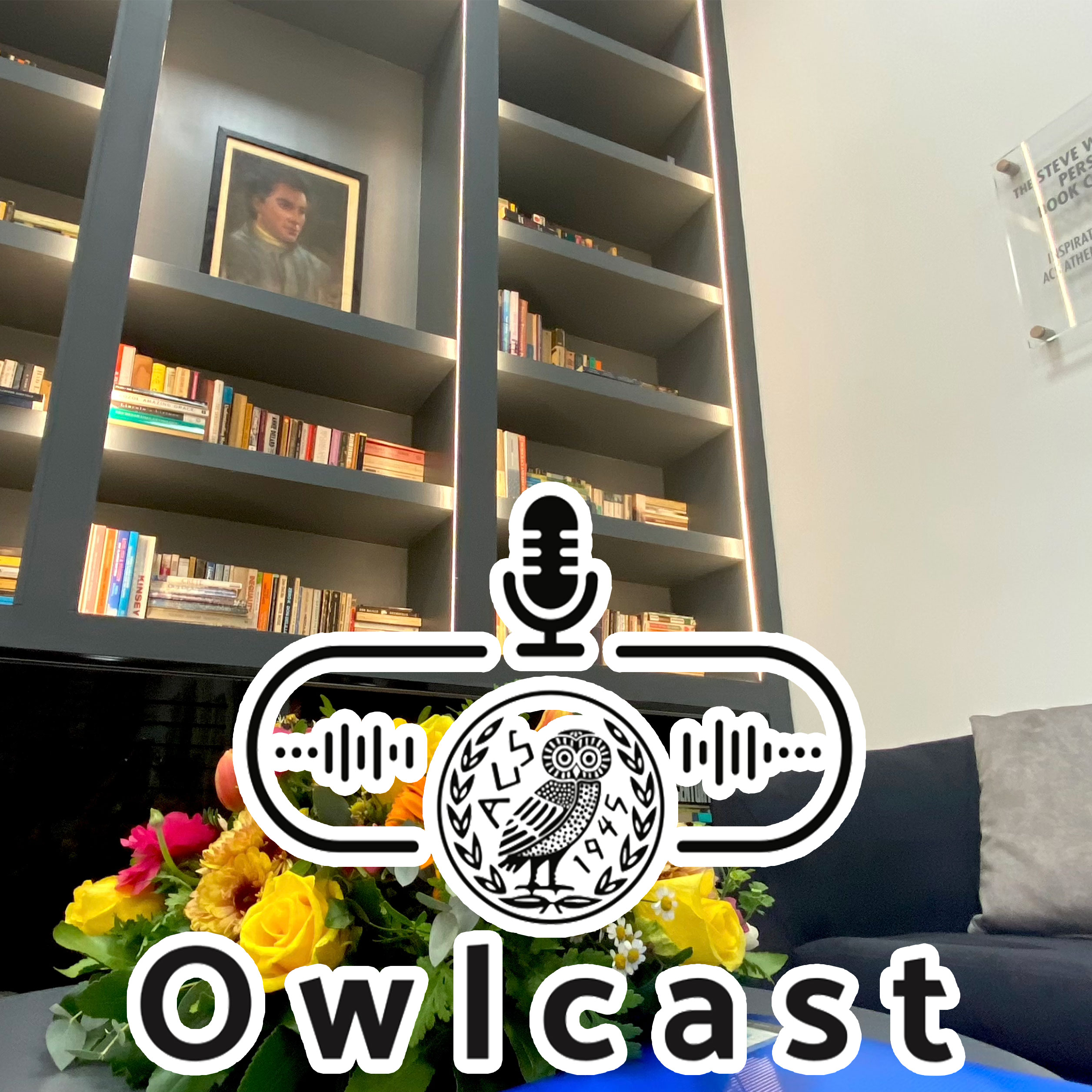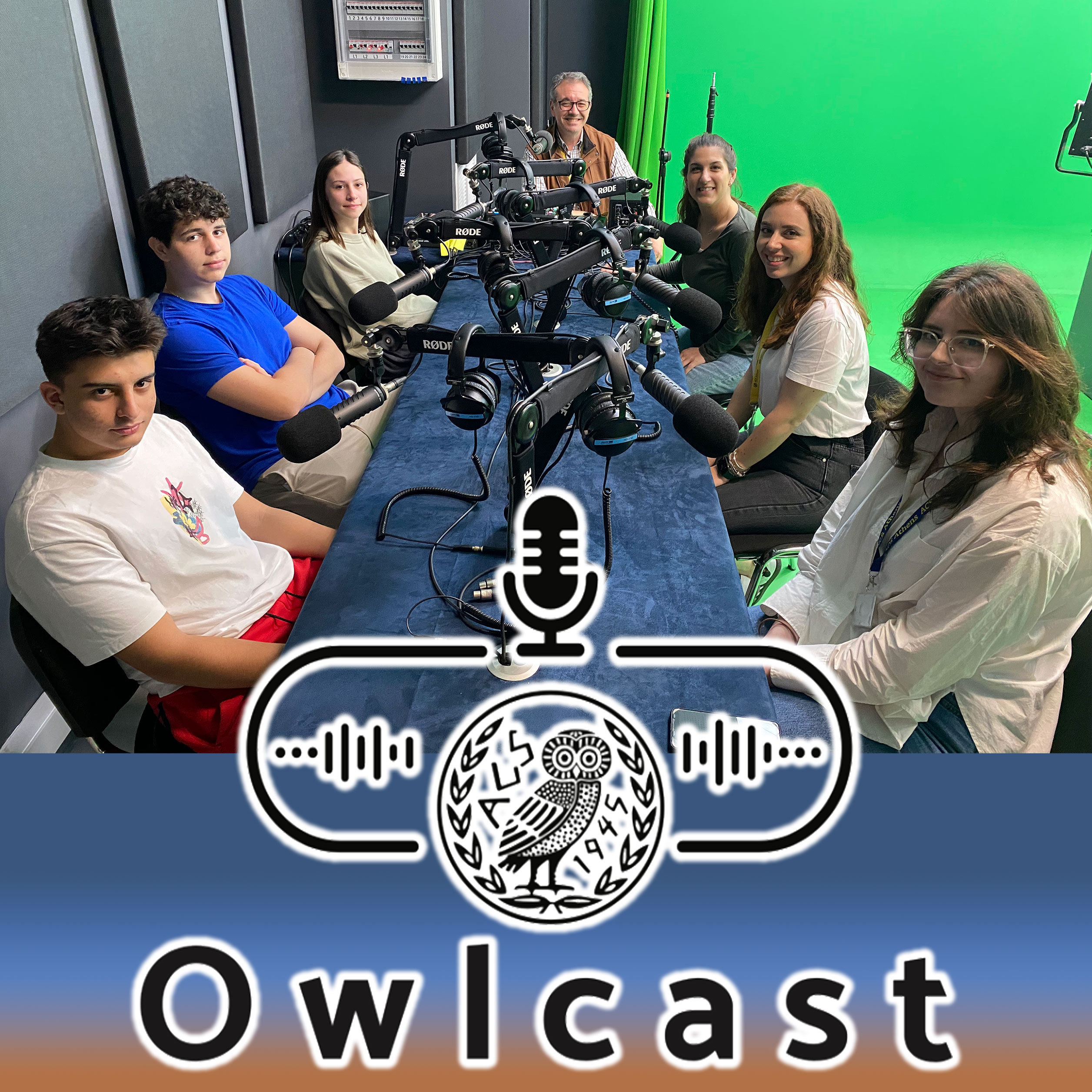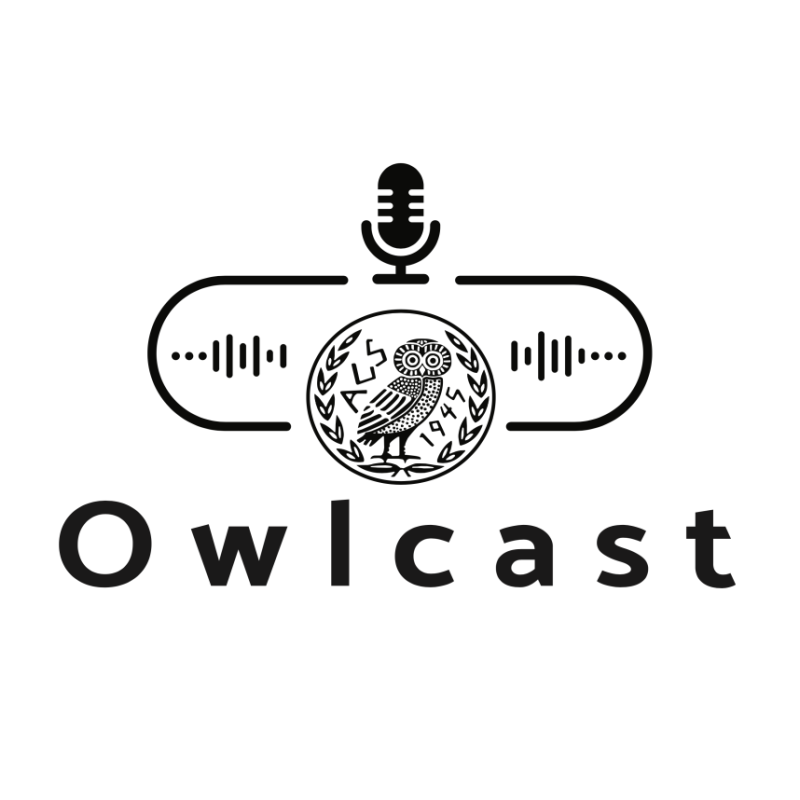[00:00:09] Speaker A: This is the Owlcast, the official podcast of ACS Athens. Listen to the exciting story of the American community schools of Athens.
Check out what drives all the members of our international community of learners as we create the education of the future.
Here's John Papadakis.
[00:00:47] Speaker B: Welcome to Owlcast, the podcast that captures and celebrates the life and achievements of the international community of ACS Athens. A school wide journey of empathy is racing toward a high energy finale this May. Back in December, more than 320 middle schoolers pressed pause on their usual schedule and dove into an immersive disability awareness celebration marking International disability day. On December 4, the gym was transformed into a mini Paralympics arena. Teams tried sitting volleyball, aimed for the jack in boccia and hurled themselves across the floor to block a chiming goal ball. Elite coaches and athletes from the Hellenic Sports Federation for People with Disabilities, including rising sprint star Vasilis Tukojoritis, were on hand to demonstrate technique, share stories and prove that resilience can be contagious.
Yet the roots of that day reach back even further. Physical education teacher Athanasia Kotsiani returned from the 2024 Paris Olympics electrified by the atmosphere of inclusion she felt in every stadium. I wondered, she told us, what if I could take that energy beyond the classroom and create real life experiences that cultivate kindness, awareness and empathy? Working side by side with middle school counselor Stelios Kalogridakis, she sketched out a three phase action research project that would turn abstract lessons into lived understanding. Phase one was the December celebration, and it began long before the first whistle blew. In Daily BASE classes, short for Building Academic and Student Excellence, students spent the week asking, what does accessibility mean in our daily lives? They mapped how ramps, captions and clear signage changed the way we all move through space.
By the time the event arrived, they were primed to rotate through five stations, the three Paralympic Sports and Liberty Guide Dog's Obstacle Course, where blindfolded students navigated an errand with only a cane or a Labrador's harness, and a theater keynote where turcohoritis candor drew in an impromptu high school audience.
Teachers admit they fought back tears as guide dog handlers demonstrated the silent choreography of canine and human communication. Phase two took empathy on the road. Just 10 days later, sixth and seventh graders fanned out across Attica to visit Margarita, Sikiaridion, To Perivolaki and the Hatzipaterion institutions, delivering art supplies, non perishable food and, most importantly, conversation. In February, eighth graders followed, volunteering in gardens, craft studios and life skills workshops at centers such as Estia and Amimoni. One student reflected that seeing adults with disabilities feel useful and contribute to society shattered his assumptions. Another wrote that sympathy had been replaced by genuine empathy. Surveys confirm the shift, but the handwritten reflections tell the deeper story. Which brings us to phase three and to you, our listeners. On May 9th at 9am the starting horn will echo across the ACS Athens Aquatic center, our swimming pool launching the first ever 24 hour ACS Athens Swimathon Making a splash for awareness Picture a relay in which the baton is a pair of goggles. Swimmers tag in for 10 minute shifts determined to keep the lanes alive until 4pm on May 10. There's even an overnight pause to let athletes and volunteers grab some rest before the dawn spring to the finish line.
During that 24 hour window, the lanes will log thousands of collective meters, each lap tracked
on a digital scoreboard that lights up the pool deck. Local businesses are matching donations, families are pledging per lap, gifts and alumni are streaming in from abroad to grab a midnight shift. It's more than a fundraiser, it's a living demonstration that accessibility swims in every direction.
Not a swimmer? No problem. The pool deck will pulse with dance performances, adaptive sport demos, raffles and hands on activities run by Liberty Guide Dogs and young artists from the Hatzipaterion centre. Entrance is €10 for one day or or €15 for the full experience. And every euro flows straight to Liberty Guide Dogs and Hatzipaterion, amplifying the very organizations that have walked this journey with our students. But first, take a moment to imagine the splash you can make. Whether you swim a single lap, staff a snack booth or cheer from the bleachers, your presence writes the final chapter of this story. Registration is open right now at
[email protected] or go to ACS.GR and search for Swimathon. Grab your suit, bring your curiosity and join us May 9 and 10 as we turn waves into ripples of change. One length, one lesson, one act of empathy at a time. With us today is PE teacher and swimming enthusiast Athanasia Kotsiani and our middle school counselor Stelios Kalogridakis to tell us all about it.
You're listening to the Owlcast. Stay tuned.
[00:06:41] Speaker C: What initially inspired you to focus on this particular project that clearly fosters kindness, understanding and empathy in students? What is the thing that, you know had you think, what can I do?
[00:06:57] Speaker D: This project was inspired by my visit to the Olympic Games in Paris 2024.
What I saw there was truly eye opening. The stadiums were packed, not just in the finals, but also in the preliminaries, the atmosphere was electric. It wasn't just the sports. It was the culture, the education that the French people, they have, the discipline, the inclusion.
Also over the past few years, I have noticed in our school that our middle school students, they seem less empathetic, sometimes very strict among them.
I wasn't very sure that they knew the challenges that people with disabilities went through.
So that inspired me to start this project. Also the fact that my husband is a swimming coach of a Paralympian swimmer. And through him I learned so many things about our dedication, resilience, the skills of the parathletic athletes they have. So then I had that idea. What if I could take this awareness beyond the classroom, just to create real life experience to the students getting involved and develop empathy, kindness, awareness, and inclusion. So this is how the journey start.
[00:08:21] Speaker C: So you mentioned empathy and you mentioned that you have observed that there is certain lack in some areas or in some aspects. And the question is, for both of you, how have you observed this kind of situation? How. How do you think there is a need for more empathy?
[00:08:38] Speaker E: Yeah. Some of the feedback that we've had in particularly from, from our teachers, in our BASE lessons that we do, which, you know, the social, emotional lessons was, we have the theory, but let's put it into practice. And that's when Athanasia came up to me and she came up with this project. It's a three phase project where the phase one culminated in that day.
It was a fantastic day. We had the help of the optimal learning program. The week before, for me, was a gamble. Okay, we can't just throw this day onto the kids. Let's set the groundwork
first. So we had a week's lesson worth on inclusion and disabilities, wide range, both physical and mental. And that culminated in the day which we can go into.
[00:09:25] Speaker C: You mentioned base. What is this? What is BASE?
[00:09:29] Speaker E: So it's an acronym. Stands for Building Academic and Student success and Excellence or bonding. Either way. Building or bonding. And we felt. Mr. Embrock, the middle school principal, let's have it as a base. This is like your homeroom in a way. Same teacher, same group of students, that they see each other every day in.
[00:09:54] Speaker C: The morning, first thing every morning. [00:09:56] Speaker E: Correct.
[00:09:57] Speaker C: And you also mentioned that there was a group of activities for these. Let's go through these activities. What happened? What transpired?
[00:10:07] Speaker E: Oh, you're talking about the day, the disability awareness day. [00:10:09] Speaker C: The disability awareness, yeah.
[00:10:11] Speaker E: So that was the first gamble, the first big day.
So we met with Athanasia we actually went and visited some of these centers beforehand. We visited Margarita in particular, in the Margarita center for students with learning and mental disabilities.
We saw that the logistics, it didn't quite work out in the way we wanted the stations to set up and do rotations. We felt they, even the center felt that it would overwhelm their own students. But nonetheless, we came up with a big plan. We had the Hellenic Sports Federation for Persons with Disabilities. They brought representatives and coaches, the Liberty Guide Dogs for the blind. And we had separate rotating stations. After the initial welcome at the theater.
[00:11:00] Speaker C: There’s a disability day, December 4th. [00:11:03] Speaker D: It's a national day for disabled people.
[00:11:06] Speaker C: Okay. Now we have different ways of observing, different ways of accommodating. But is this something that also engaged you or also inspired you, other than the Olympic Games that you mentioned?
[00:11:20] Speaker D: Definitely was.
[00:11:22] Speaker C: What is the significance of this kind of a day in a school environment? How can this be communicated to the school community?
[00:11:30] Speaker D: It's a great opportunity to celebrate disabilities.
The students learn more about disabled people and different types of disabilities. Because we don't have just physical disabilities, we have the mental disabilities, intellectual disabilities. So we found it as a great idea, starting from that big celebration, to educate our students about all different types of disabilities. And we started with this nice celebration, Stelios said, before inviting mostly physical disabled athletes and people to come and talk to our students. And then
we planned more activities and more events with intellectual disabilities and mental disabilities. [00:12:13] Speaker C: Can you describe some of these activities?
[00:12:15] Speaker D: So it was a really nice one. That was a five station rotation for the students. So we have five stations. We had a station that we have sitting volleyball. So people from the Hellenic Sport Federation for Persons with Disabilities, they came and they demonstrate the sport of sitting volleyball with athletes. In another station we had Boccia, that is a Paralympic sport. In the gym we have Goalball, another Paralympic sport. And then we have in the atrium, we welcome Liberty Guide Dogs foundation that they train guide dogs for blind people. And then in the theater, we had a nice para athlete, Mr. Tourkochoritis. He delivered a really nice speech.
[00:13:01] Speaker E: He's a rising, rising track and field star. Keep an eye out for him. [00:13:04] Speaker D: Yeah, it was very inspiring.
[00:13:05] Speaker E: Amputee from the knee down in both feet. And a sprinter, I think world class amputee with prosthetics. Correct? Yes, yes.
[00:13:14] Speaker D: So every activity was about 30 minutes. And the students that were rotating around every group, they had the opportunity to go through three.
[00:13:24] Speaker E: Three, I think three stations.
[00:13:25] Speaker D: Three stations spend time, demonstrate the sport or participate in activities and getting the Shoes of those people that are playing the sport or they. They're blind.
And it was very inspiring.
[00:13:39] Speaker C: Can you describe any particular moment where a student, our student came to you and told you something that surprised you or you saw students that reacted in a non conventional way?
[00:13:53] Speaker E: Yeah, I mean, I saw it. I was in charge of welcoming Mr. Tourkochoritis in the theater. And after he finished his presentation with the middle school, a passing high school class stayed and saw the next one because they were really enthralled by his speaking and his attitude and his positive energy. And then at the end, we even had elementary school students come and they saw and visited him and they wanted to ask for autographs. He even did a little bit of walking around and running and jumping and. And students are really impressed by him.
And that was one. But I also. The Liberty Guide dogs, to me was really impressive, especially with the feedback from kids and students and.
[00:14:34] Speaker D: And the teachers.
[00:14:35] Speaker E: Teachers I see crying out, yeah, very emotional. They set up an obstacle course in a way, and the dog would guide you. You're blindfolded.
And it was a wonderful experience. And they stayed extra. They stayed about an hour extra while everyone else was finished, because they wanted to give more opportunity, more people the opportunity.
[00:14:54] Speaker C: And how about reactions from the people who came as guests?
[00:14:57] Speaker D: They really loved it as well. They never came to ICS before. It was their first time. And we promised that this is going to be like every year event. We're going to make it annual.
[00:15:09] Speaker C: That was my next question. I mean, how do we plan or how do we think of doing this kind of community service, field trips or activities for. How do you see them complementing Disability Awareness Week?
[00:15:22] Speaker E: I think that this was the biggest gamble and the biggest worry that Athanasiya had is she's like, I don't just want this to be a one off. She wanted this to continue part of the service learning component and what she's doing in her action research. So December 4th was just the beginning. Then we came back 10 days later and the 6th and 7th grade went on the field. So we went to them, went on the field trips. The seventh grade went entirely to the Hadziba Darian Institution. And then the sixth grade, we split. Each base class went to a separate center. So that was right before the winter break. We were able to gather donations, perishables, arts and crafts that each particular center asked for. And especially, you know, this. None of this would have been possible if it wasn't for Athanasia running around and trying to organize this. But that was Phase two. And then when we came back from break, the eighth grade had its turn and they went.
[00:16:19] Speaker D: Can I mention the centers that we visited? [00:16:21] Speaker E: For sure.
[00:16:22] Speaker D: So the seventh graders, Stelios said we visited the Hatzipaterion center. The sixth graders, we visited Margarita, Sikiaridio center and To Perivolaki. The feedback was great. All the students, the parents, everybody, they had only to say good things about the visits. So all those commons, they encouraged us to plan for the 8th graders that we went. On February 4th, we went our visits and we visited Estia, To Ergastiri, ELEPAP, Epilogi and Amimoni.
So every base group went to a different center. And still the impact that those activities they had to our students was significant.
We can see from the students, from the parents, the emails, the survey that.
[00:17:08] Speaker C: We sent, I was going to say about the survey. I was ready to ask if there is any way to invite feedback. You say you have this, you have emails, right?
[00:17:18] Speaker D: Yeah, definitely. We wanted to receive the feedback. That's why we sent in a survey. And the numbers only told part of the story because what really mattered were the personal reflections. So some of the students tell us about this. Yeah, some of the students, they said they see different now than the adults with disabilities. They don't feel uncomfortable anymore, they feel respect. They're not feeling any more sympathy, but empathy. And this is the most important thing.
[00:17:45] Speaker C: Do they understand the difference?
[00:17:47] Speaker D: They do understand now. Yeah, they do understand.
[00:17:49] Speaker E: As I remember, one of the students I went to, I had the pleasure of going to Gastiri with the 8th grade and they had groups of their students working in different, like gardening center, arts and crafts. So one of the kids comes up to me, he's like, I'm really glad because these people are older and they make them feel useful and contributing to society. And
he says, I never really thought that. So it was a really eye opener for that particular student of ours.
[00:18:16] Speaker C: Did we have any student that after this experience, both the trips, but also the activity here in the school, that they came to you and they say, you know what, I have this idea to do this, or how about if we do that next year, did you have students like that or our faculty, I mean, people from our community?
[00:18:34] Speaker E: Well, like I said, John, we're still in phase two. Now phase three is coming and phase three is in May. And that's where again within our campus than ACS is organizing a Swimathon. So this is a 24 hour swimathon charity event.
We invite members of the community ACS community. And not only to come in, swim some laps, raise money and awareness for these centers.
[00:18:58] Speaker C: And how about you personally? I mean, you actually initiated this, but the school in general has had the tradition over the years of service, of volunteer work, of outreach to the community and all these things. How has this experience affected you personally?
[00:19:16] Speaker E: I think, you know, when I say came up to me, I immediately jumped on him. Absolutely. I definitely want to do this because it's one thing to do the theory in the class and then the theory is shelved, but to actually see it. And I remember prior to Covid, we used to go to the center for Alzheimer's here in Halandri. And I remember a distinct kid. And again, most of these centers, they don't speak English, John. And one of the kids, he was just. He had an elderly lady who had severe Alzheimer's. All she needed was a sense of touch and she was just touching his hand and he was, you know, he didn't understand, he didn't speak Greek, but he was just there for her. And that to me, it made a difference. I said these things do make a difference in both the students lives and who they're going to help.
[00:20:00] Speaker D: I totally agree with Stelio. My life has changed. When I participated in the Paralympic Games in Athens 2004, when I got involved with para swimming and para athletes and I grew up with. In my class we had Mimi, who was a Down syndrome boy with. We grew up together. He learned us how to be kind, polite, to include everyone and him in the game. So I grew up like this. So I wanted to give that back to my students to understand that we need to include everybody. This is our world. Our world has disabled people around us. Two out of 10 in our society, they have a disability. Either we can see or we cannot see. So we need to be aware, we need to be able to act, to give back if we have that opportunity, to be kind, be polite, be respectful.
And this is what I wanted to give to my students. I hope we're in a good way.
[00:21:09] Speaker C: Well, this is I guess the ultimate outcome from this. To pass on this passion and this feeling of empathy that you feel to the students because that's how they're going to learn how to live their lives.
Congratulations to both the whole team that participated. And let's have this on a regular basis. We already do. But make it a little bit more strong for the entire school.
Looking forward for the next phase.
[00:21:40] Speaker E: Yeah, you said late May, right? There you go.
[00:21:43] Speaker D: Eight and nine will be our final community Celebration event. So the SwimAthon lap for awareness. We would like to invite everybody to participate.
It's going to be a big celebration, I promise. This is going to be the double Event. [00:21:56] Speaker C: and swimming is your sport.
[00:21:58] Speaker B: So it's going to be a super.
[00:22:00] Speaker D: Many performances, many highlights. We're going to have, we're going to have again the Liberty Guide Dogs. We're going to have a performance with dancers, disabled dancers. We're going to have a lot of Paralympic sports, many happenings, competitions. So we invite everybody to come and.
[00:22:17] Speaker C: Join us and there is an open invitation to do another episode with the participation of some of these people that are coming as guests or maybe students in May.
[00:22:27] Speaker B: So stay tuned.
[00:22:28] Speaker C: May 9th, May 8th and 9th. Thank you so much both. [00:22:32] Speaker D: Thank you.
[00:22:46] Speaker A: You are listening to the Owlcast, the official podcast of ACS Athens. Make sure you subscribe to the Owlcast on Google Podcast, Spotify and Apple Podcasts. This has been a production of the ACS Athens Media Studio.



